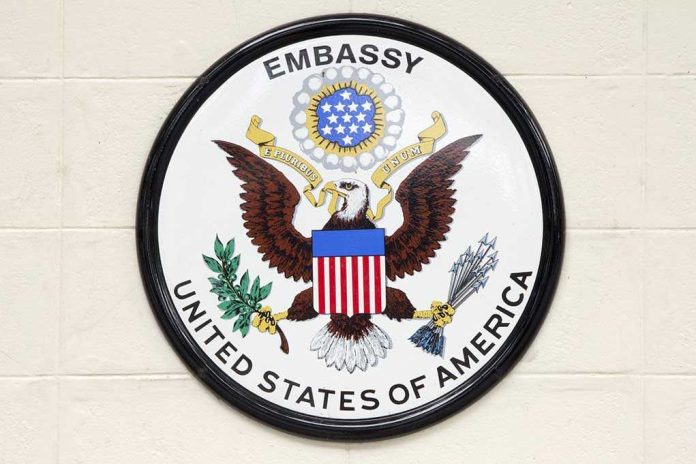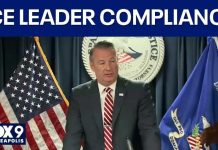
A single warning from the U.S. Embassy has shattered the calm of Trinidad and Tobago, turning paradise into a crucible of regional turmoil and American anxiety.
Quick Take
- The U.S. Embassy’s October 2025 alert marks an unprecedented move, urging Americans to avoid government facilities in Trinidad and Tobago.
- Escalating U.S.-Venezuela tensions, coupled with deadly U.S. military strikes, have triggered a nationwide State of Emergency.
- Local security threats and regional instability now converge, putting American citizens and island stability at risk.
- Implications for tourism, migration, and diplomatic ties could reshape the region’s future for years to come.
Embassy Alert Signals Crisis for Americans and Locals Alike
The U.S. Embassy’s security alert on October 18, 2025, did more than raise eyebrows; it sent shockwaves through Trinidad and Tobago’s expat and local communities. Americans were told, bluntly, to avoid all U.S. government facilities, a move rarely seen even in high-threat zones. The timing could not have been more volatile: the alert followed a string of U.S. military strikes in Caribbean waters, aimed at suspected drug traffickers but resulting in multiple deaths. The Government of Trinidad and Tobago responded with a sweeping State of Emergency, heightening anxiety and uncertainty for citizens and visitors alike.
This isn’t just about a travel warning. It’s about a crossroads where American foreign policy, regional criminal networks, and local vulnerabilities collide. For the 40+ crowd who remembers the Cold War and the U.S. invasion of Grenada, this moment feels both familiar and deeply unsettling. The U.S. Embassy’s alert is not a drill; it’s a red flag in a region where geopolitical tremors have real, immediate consequences.
Regional Turmoil: Tensions with Venezuela and the Local Fallout
The roots of this crisis run deep. Trinidad and Tobago, just a short boat ride from Venezuela, has always been exposed to regional instability. The recent escalation began in early September 2025, when American military forces targeted suspected drug traffickers operating in the Caribbean. The strikes were lethal, and according to local reports, some Trinidadian fishermen vanished—suspected casualties of the crossfire. These events poured gasoline on already simmering tensions between the U.S. and Venezuela, a nation long at odds with Washington over sanctions, narcotics trafficking, and political legitimacy.
Local authorities faced a perfect storm. Beyond the threat of regional spillover, a powerful criminal network emerged inside Trinidad and Tobago, forcing the government to declare a nationwide State of Emergency on July 18, 2025. Parliament later extended the SOE for three months, empowering police and military to act decisively. The island’s proximity to Venezuela meant not only criminal threats but also a surge of refugees, straining public resources and exposing fault lines in security and social cohesion.
Stakeholders Scramble as Security Risks Multiply
At the center of this drama are several key actors, each with their own agenda and anxieties. The U.S. Embassy, charged with safeguarding American citizens, has taken an uncommonly direct stance, reflecting the seriousness of the situation. Trinidad and Tobago’s government and police, under public pressure, have deployed tactical teams and ramped up patrols, particularly near vulnerable coastal areas. The Venezuelan government, meanwhile, faces accusations of complicity in regional criminal flows, all while bristling at U.S. military actions close to its borders.
Ordinary people are caught in the crossfire. Local communities, especially those near the coast, now live under the shadow of both crime and the potential for international escalation. American expatriates and tourists find themselves navigating a landscape transformed by fear and uncertainty, while Venezuelan migrants—already vulnerable—face the risk of backlash and xenophobia. Regional experts warn that if Venezuela further destabilizes, the shockwaves will be felt first and hardest in Trinidad and Tobago.
Immediate and Long-Term Implications for Security, Economy, and Diplomacy
In the short term, the island’s famed hospitality and tourism industry may suffer as travelers reconsider their plans. The State of Emergency, while not imposing curfews, grants law enforcement sweeping powers, disrupting daily life and eroding public confidence. American citizens and embassy staff must now weigh every move, acutely aware of the risks posed by both organized crime and the unpredictable consequences of U.S. military actions in the region.
Longer term, this crisis could alter the Caribbean’s geopolitical landscape. Trinidad and Tobago’s leaders face the unenviable task of balancing their historic ties to the U.S. with the realities of geography and economics—Venezuela is both neighbor and necessary partner. Should U.S.-Venezuela hostilities escalate further, the island could become a flashpoint for broader regional conflict, with American citizens on the front line. The economic, social, and political repercussions may linger long after the headlines fade, reshaping migration, investment, and the region’s sense of security for a generation.













